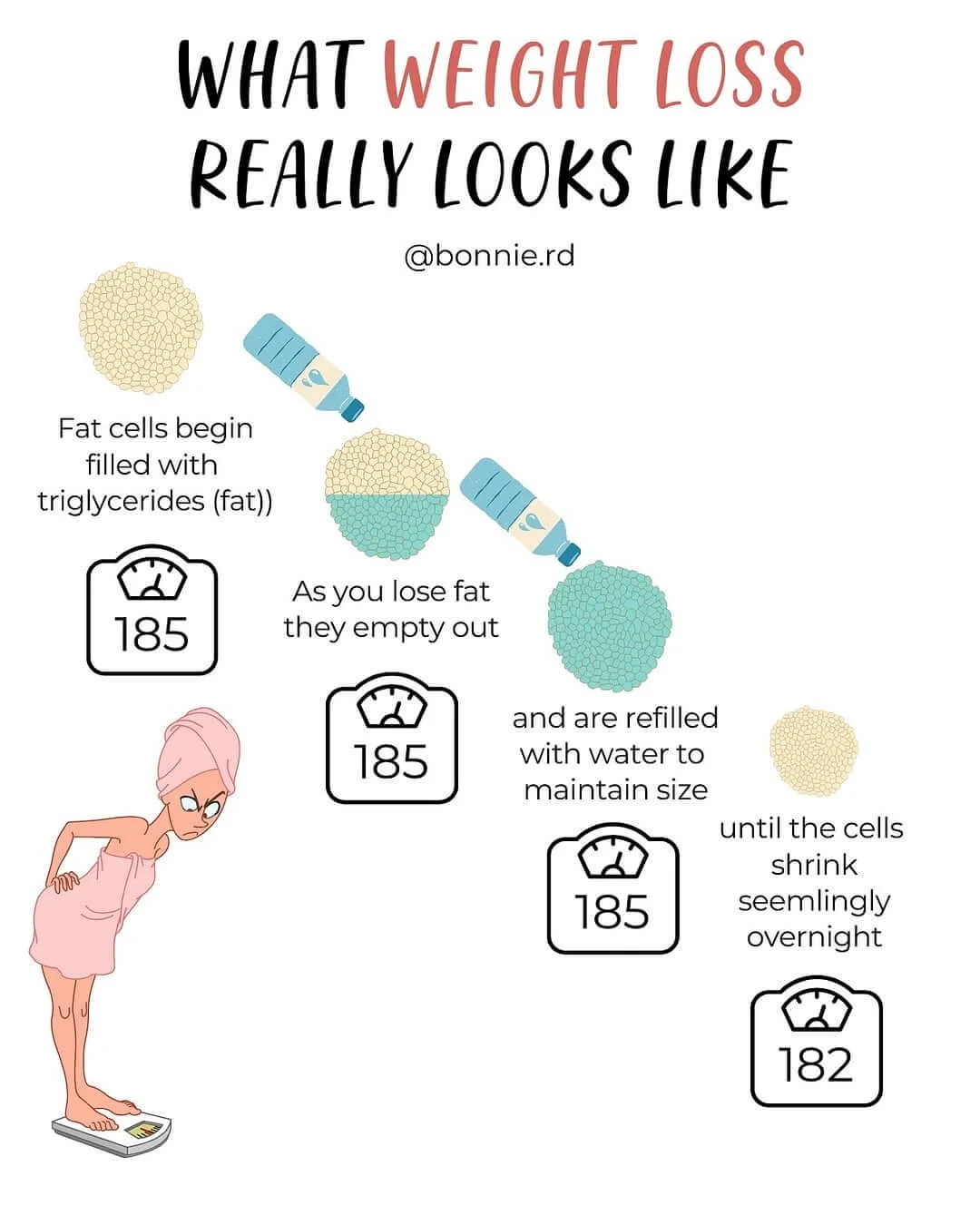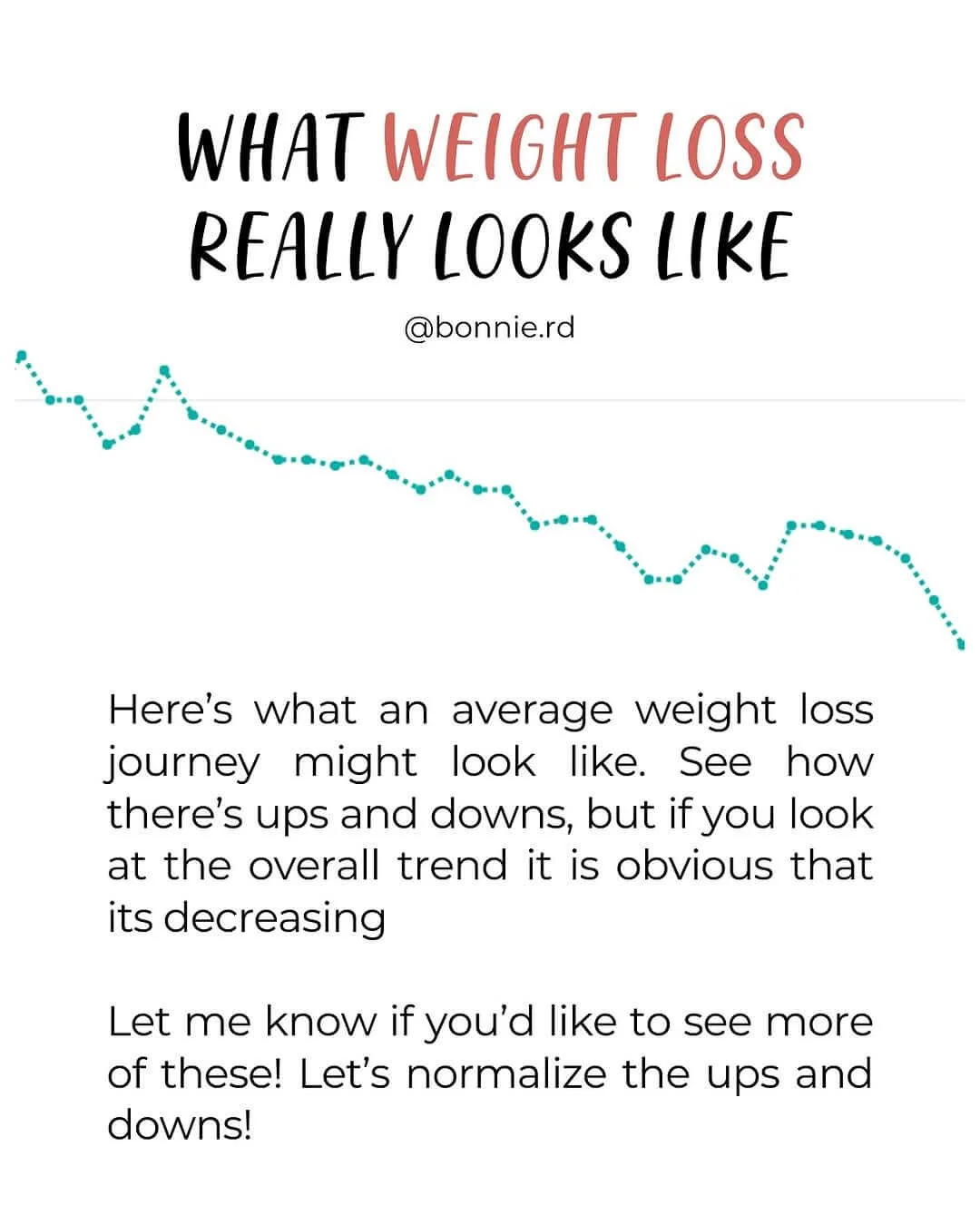Weight Loss vs. Fat Loss: What's the Difference?
Weight loss and fat loss are often used interchangeably (even by me sometimes!), but there actually is a difference between the two.
Long story short: Weight loss focuses on reducing your overall body weight, and fat loss reduces fat specifically.
Long story long: Keep reading for the difference between weight loss vs. fat loss!
Key Takeaways:
Explanation of the key differences between weight loss and fat loss
How nutrition plays a role in both
Do’s and Don’ts for losing weight
What Is Weight Loss?
Weight loss is an overall reduction in body weight, often measured by a specific number on a scale.
This could include the loss of:
Fat
Muscle
Water
Digestive contents
Keep in mind that the number on a scale can fluctuate daily due to factors such as water retention, food intake, and hormonal changes.
If you see a big drop in your weight in one or two days, that’s usually water content, not body fat. Here’s a few instagram posts that I wrote that can really illustrate this example.
Why might you want to focus on weight loss?
If you want to lower the number on the scale, weight loss is your goal.
Losing weight is very easy to measure. The number on the scale is pretty straightforward and easy to pinpoint every day.
But there are other reasons why you might choose to focus on weight loss:
Medical reasons: Doctors may recommend weight loss, especially for people who are overweight.
Short-term milestones: People who are preparing for a medical procedure or event might need to lose weight quickly.
Limited time or resources: If you aren't following a fitness plan, general weight loss through nutrition and movement is more realistic.
Overall weight loss isn’t needed for everyone. Most people actually want to lose fat (which typically results in some weight loss, too!)
What Is Fat Loss?
Fat loss, on the other hand, is a reduction in body fat specifically, as opposed to weight loss where you might be losing muscle.
It’s a more precise indicator of how you’re changing your body composition and health. However, it’s a little more tedious to track how much fat you’re losing. You may or may not see dramatic changes on the scale, but your body will feel and function better.
It’s not about how much you weigh - it’s about how you feel.
Why You Would Focus on Fat Loss
Here are some reasons why fat loss would be your goal:
Improved Muscle Definition: Fat loss focuses on keeping muscle, resulting in a leaner, toned appearance.
Athletic Performance: Athletes or active people who want to reduce fat without sacrificing strength or endurance.
Long-Term Focus: Fat loss leads to better metabolic health than weight loss alone.
Avoiding Muscle Loss: This sometimes happens during weight loss. Muscle loss can lead to slow metabolism and tiredness. Sometimes you lose a little bit of muscle as you lose fat, but you want to avoid that as much as possible.
When you focus on fat loss, you’ll start to see these benefits:
Improved body composition
Preserved muscle mass and strength
Healthier metabolism
Reduced visceral fat
More sustainable and long-term health benefits
Focus on fat loss to improve your overall body composition and health.
Why Does The Difference Matter?
The main point I want to drive home is if you want to lose weight, that could include muscle. Focusing on fat instead will avoid the loss of muscle as much as possible, and replace your weight in body fat with muscle.
Weight loss and fat loss can happen at the same time, but they can also be independent of each other.
If you lose fat but your body weight stays the same, it’s usually being replaced by muscle.
Sometimes, people want to lose fat and weight, and that’s perfectly fine!
Understanding the difference of weight loss vs. fat loss will help you focus your efforts and know how to measure your progress.
Why the Scale Isn’t the Whole Story
I want you to be careful about looking at the scale.
Not only can it be discouraging if you don’t see results right away, but it can be misleading, too.
Weight can increase even when fat is going down (especially if you're building muscle.)
Water retention can fluctuate daily, impacting the number you see.
It only shows total body weight, which doesn’t tell you the bigger picture of your health.
Here are some better ways to measure your body fat percentage at home:
Progress photos
How clothes fit
Body measurements
Body fat calibers
Strength and endurance gains
Energy levels and mood
Better sleep at night
I want to mention that body fat calibers and digital scales that show body fat percentage are extremely flawed. They can be off by as much as 10%!
However, they can still be a useful tool to see trends and progress over time. Even if the numbers aren’t right, you can still see how they are changing month over month.
Ilona Maher Example
This discussion reminds me of Ilona Maher, an American Rugby player, Olympic bronze medalist, and Sports Illustrated swimsuit model.
In a popular TikTok video, she discusses how she grew up being considered overweight. At 5’10”, she weighs just under 200 lbs, with a Body Mass Index (BMI) of 29.3.
(I don’t want to get into BMI too much today, but let me know if you want to know more about it!)
The scale indicates that she is overweight for her height.
However, it doesn’t tell you that her body weight comes from how much muscle she has.
By working with a dietitian, she knows that 170 lbs of her body weight is lean muscle.
The scale and her BMI don’t show what she can do on the rugby field.
A number doesn’t tell you what your body can do.
I love this video she shares about her body image!
How Does Nutrition Play a Role in Weight Loss vs. Fat Loss?
Nutrition is a key point that a lot of people think they can skip, as long as they work out enough.
Unfortunately, that is a myth that needs to be debunked today.
You’ll make things 100% harder if you try to lose weight or fat without factoring in your diet.
Nutrition is the fastest, most effective, and healthiest way to lose weight AND fat.
How exactly does what you eat impact your weight goals?
Calorie Deficit: You need to burn more than you consume, but not at a rate so extreme that you can’t keep it up. Eating nutritious foods will help keep you on track.
High Protein Intake: Protein helps preserve muscle mass during fat loss, boosts metabolism, and keeps you feeling full longer. Eating a lot of protein helps to keep you from reaching for snacks all day!
Focus on Whole, Nutrient-Dense Foods: Foods like lean proteins, healthy fats, fiber, and complex carbs support your energy levels throughout the day while working toward your weight goals.
Sustainable Habits: Eating nutritiously becomes second nature when you see how much better you feel. It promotes long-term lifestyle changes, rather than crash dieting.
This doesn’t mean you have to cut out everything you love. I don’t subscribe to the idea of cutting out entire food groups for dieting purposes. It’s just not sustainable.
Instead, incorporate more fruits, veggies, and lean protein into your diet. Give your body the fuel it needs instead of depriving it.
Do’s and Don’ts of Losing Weight and Fat
Let’s summarize what we’ve learned about the difference between weight loss vs. fat loss!
DO Eat Whole, Nutrient-Dense Foods
Eat more lean proteins, healthy fats, fiber-rich veggies, fruits, and whole grains to fuel your body and support metabolism.
DO Get Enough Protein
Protein helps preserve muscle during fat loss and keeps you fuller longer. You won’t snack as much!
Here are some protein-packed snacks to keep on hand.
Plus, my favorite protein shake recipes!
And if you want to know exactly how much protein to eat to hit your weight goals, try this calculator:
DO Walk More
Walking gives you the exercise you need to support your weight and fat loss goals. It’s easier to go for a walk every day than to go to the gym.
DO Lift Weights
That being said, lifting weights helps retain muscle mass as you lose weight. You’re building the muscles as you reduce the fat around them.
DO Stay Hydrated
Hydration is key to your goals! Sometimes you think you’re hungry, but you’re actually just thirsty. Drinking enough water supports digestion and actually reduces water retention.
Here are some hacks to drink more water throughout the day!
DON’T Starve Yourself
Extreme calorie restriction and eliminating entire food groups can slow your metabolism. You’ll end up losing muscle in addition to fat, which reduces your metabolism.
You’re likely to gain the weight back as fat because you cannot regain muscle this way. It’s not a sustainable or healthy way to get the body you want.
DON’T Rely on the Scale Alone
Weight can fluctuate every single day. Don't let it define your success by itself. Make sure to always compare your scale results to your body measurements and photos.
You could get a digital scale that also measures your body fat. It can be helpful to see a bigger picture of your weight loss.
DON’T Expect Overnight Results
Healthy fat loss takes time. There is no such thing as a quick fix. Give your body time to adjust to your new lifestyle.
A good fat loss goal is 0.5% to 1% of body fat per week. Losing more than 1% of bodyweight per week can lead to lost muscle, which lowers metabolism. If there’s one week where you lose body weight faster or slower, that’s fine and normal! And these numbers are just an average - everyone is different!
DON’T Ignore Mental Health
Your relationship with food, body image, and self-worth matters just as much as physical progress. If you’re getting depressed or anxious, speak to a professional.
DON’T Compare Your Journey to Others’
Everyone’s bodies and lifestyles are different. A new mom in postpartum will have different goals and needs than a professional athlete.
You can’t compare yourself to others. Trust me - I’ve been down that road and it only leads to feeling discouraged and frustrated.
The extra pressure you put on yourself isn’t necessary.
Unplug from social media and focus on your well-being.
P.S. That’s why we offer individualized nutrition coaching - we want to make sure the tools and habits we put in place are perfect for YOU!
Supporting Your Weight and Fat Loss Goals
I hope you understand the difference between weight loss vs. fat loss!
Your body does amazing things every single day, and a number on the scale doesn't define you. Instead, focus on how you feel and function every day. That's the real win!
Sustainable and long-term diet and exercise habits will help you reach your weight loss and fat loss goals.
Our quick and easy cookbook is full of nutritious meals with five ingredients or fewer! These meals are designed to help you lose weight and feel great. Download it for free right here.
FAQs About Weight Loss vs. Fat Loss
Can I lose fat and not lose weight?
Yes, sometimes you will lose fat but build muscle at the same time. In this case, your weight won’t change too much but your measurements will. This is why it’s important to take measurements every week!
Which body part loses fat first?
You actually can’t spot-reduce fat. A hundred crunches won’t burn belly fat faster than arm fat. You have to think of your body holistically and reduce fat by eating nutritious foods, lifting weights, and doing some cardio.
Can you lose noticeable weight in 3 weeks?
You will start to see your weight loss on the scale and in measurements in a month. You’ll see differences in photos in two months. People in your life will start to notice your weight loss in three months.
It takes time to make changes to your body. Stay patient, consistent, and determined!


